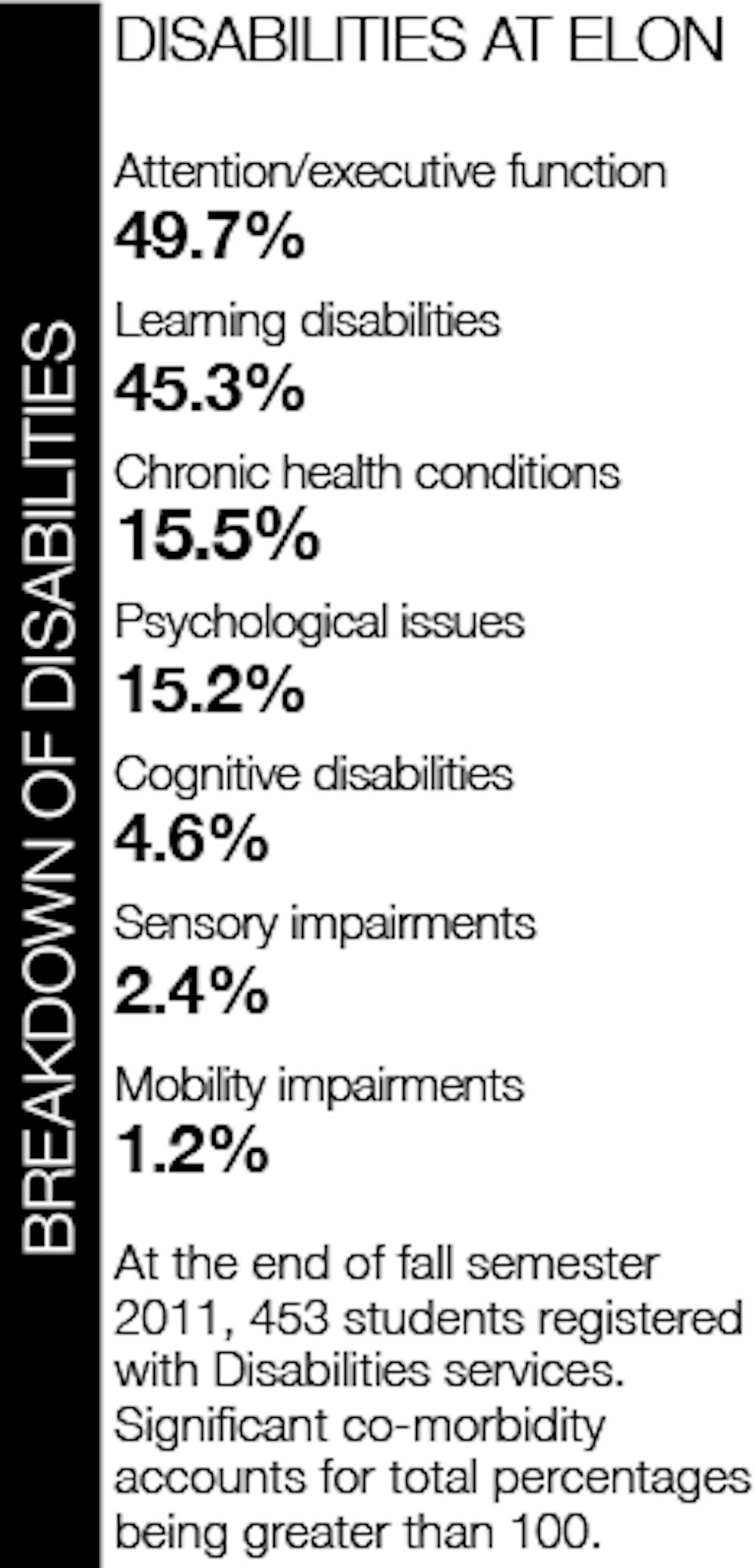Although Elon University prides itself on its student-faculty ratio of 13:1, not all staff-related ratios on campus are quite as low.
Susan Wise, Disabilities Services coordinator, is in charge of about 450 undergraduate students and 25 graduate students registered with Disabilities Services, and she is the only staff member.
“Obviously, just meeting the day to day needs of so many persons is challenging,” Wise said. “It is difficult to be proactive in addressing needs of current and incoming students, coming up with new plans and services, etc., in this environment.”
Wise encourages more students who are qualified to receive accommodations to register, but knows she won’t be able to provide them with the best services.
“I am sure there are students out there who could benefit from accommodations who have not registered with my office,” she said. “Certainly, with additional staff members, we could provide better, more efficient and proactive services.”
Senior Anne Lukens, who is registered with Disabilities Services for her ADHD, anxiety, dyslexia and dyscalculia, said a university’s disability accommodations were a major consideration in her college search. She said that although she was impressed with Elon’s services, she’s personally been affected by the lack of staffing since arriving on campus four years ago.
“Susan is busy a lot of the time,” Lukens said. “She’s really good at getting back to you, but she’s also got to deal with tons of the student body. She campaigns tirelessly for us. She’s great at what she does, there just aren’t enough of her.”
The solution starts with raising awareness, according to junior Amelia Maki, who is working with students in her women and gender studies capstone course on an awareness campaign. By spreading the word about the different types of disabilities that can be accommodated and the various accommodations available, she hopes more students will utilize Disabilities Services.
“The university doesn’t really see the need to give more funding or get more staff,” Maki said. “If more students sign up, (the university) is going to have to hire more people, and they are going to have to give more funding.”
Wise has a number of things she would like to implement in Disabilities Services that would require additional staffing. Her “wish list” includes orientation programming for students with disabilities, a mentoring program for the students and more community outreach and awareness programs. She also hopes to work with faculty and staff about disabilities-related issues.
Senior Katie Atkins, who is working with Maki on the awareness project, also sees the importance in educating professors on how to interact with students with disabilities.
“The sense that we’ve gotten is that professors don’t know what the protocol is for certain things,” she said.
Lukens has experienced a range of reactions from professors regarding disability accommodations, especially when it comes to needing a note-taker. One professor offered her his own notes, which she said was the most helpful solution. But not all professors have been as understanding.
“A lot of times, it’s really difficult to get teachers to understand the concept of a note-taker,” she said. “I have to either be paying attention or writing. I can’t do both, because writing is hard for me.”
Lukens, whose earliest memory is having a panic attack, is constantly frustrated when trying to explain what makes her different from her peers.
“Since everyone is differently abled, it’s hard for someone else to get in the mindset of someone whose brain works different than theirs does,” Lukens said. “My brain is wired differently, and I see the world slightly cockeyed. It’s frustrating trying to explain the way I see things to other people.”
One of the primary goals of the awareness project is to erase the stigma associated with disabilities. Although many people associate the word “disability” with a physical impairment, less than 2 percent of the student body is registered with a physical disability.
“I thought it was very interesting to see what a low percentage physical disabilities are on this campus,” Maki said. “Which goes to show that this campus is not very welcoming, not very accessible. If Elon really wants to provide students with this diverse education and experience that they say they want to, you need to make it available to everybody.”
The rest of the registered students have “invisible” disabilities, which accounts for a lack of recognition by the rest of the student body, Maki said. Lukens said she hopes students begin to become more accepting of every student on campus.
“Disease is incredibly unattractive,” she said. “You don’t want to find that there is something wrong with someone you care about. I can’t tell them (that) sometimes, my anxiety gets so bad that I have to curl up in a ball, and my whole chest feels like it’s constricted. It’s scary for me, why should you be the one to recoil. I just want people to be patient with me.”


